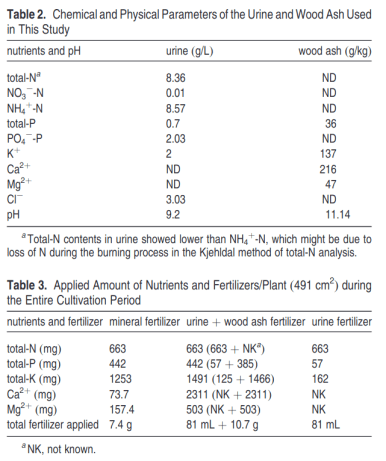
Nitrogen is the biggest bottleneck in post-fossil-fuel food production. Before the advent of the Haber-Bosch process, which compresses atmospheric nitrogen (N2) and hydrogen (H2) into ammonia fertilizer (NH3), nitrogen was harvested everywhere it could be found, from remote islands covered in bird droppings (even leading to a war) to domestic dung heaps. Surprisingly enough, the average human excretes between 800 and 2,000 ml of urine per day, which contains about 9.3–23.3 g/L nitrogen, 0.8–2.6 g/L phosphorus, and 0.5–1.1 g/L potassium, as well as inorganic salts and other constituents (according to a NASA study).
How much would this fertilize? Really roughly, a tomato plant, for example, needs about 100–120 g N, 50–60 g P, and 150–170 g K (calculated from data here). If being grown hydroponically, a tomato plant would need the nitrogen from 10-15 L of urine. But if it is in the ground, some of that is already provided by the soil. That amount of urine, however, would only provide at best 10-15 g K, although the plant needs more than ten times that amount. That’s where the ash comes in. Ash has about 137 g/kg K, meaning a single kilogram would have enough potassium (and other salts) needed for a tomato plant.
Now you might be a little uncomfortable by the idea of using urine to fertilize food crops. Well, chances are you’ve already been eating foods that were grown with urine fertilizer (a part of what are called biosolids, derived from sewage; about 55 percent of sewage sludge is applied annually as fertilizer in the US). Unlike this mix of composted feces, urine, and other “wastes” from wastewater treatment facilities, urine alone is fairly safe. It is largely sterile when taken directly from the source.
Finnish Urine and Ash Fertilizer Study
A Finnish study, “Stored Human Urine Supplemented with Wood Ash as Fertilizer in Tomato (Solanum lycopersicum) Cultivation and Its Impacts on Fruit Yield and Quality,” looked at growing tomatoes with urine and ash through a variety of lenses: chemical content, taste, yield, and plant response.

The study used four sets of ten tomato plants in identical plants and soil. Each set received a different fertilizer treatment: no fertilizer, store-bought mineral fertilizer, urine and ash, and urine alone. Throughout the course of the season, a similar amount of nitrogen (0.7 g) was applied, whether mineral or urine. Similarly, a uniform amount of potassium (1.3 and 1.4 g) was given from mineral and ash fertilizers. Urine alone treatment had no added potassium. The control (no fertilizer) got none of these additions.
They measured the growth of plants and foliage (by vine length and leaf area). Tomato fruits were tested for fecal and other bacteria potentially present in human excretions. Some fruits were also mashed and measured for nutrients, sugars, and other compounds. Finally, a panel of twenty volunteers taste tested tomatoes from each set.

The results indicated that the urine and fruits were free of harmful bacteria (largely due to high pH). The plants showed significant growth (both length and leaf area) with the mineral and urine plus ash treatments. Similarly, the biomass and fruiting reacted most positively to the urine and ash application. Molecular analysis essentially shows that you get out what you put in: the more diverse fertilizers (commercial mineral and urine plus ash fertilizers) produced plants with more elements, such as magnesium, although urine alone contributed to a higher protein content (more seed production). Most importantly for the end user, the panel of 20 testers could not differentiate the urine-fertilized tomatoes from the others.

Stay tuned for more about using urine as fertilizer, including practical applications and a prototype, waterless, odorless urine collecting container.
Make a one-time donation
Make a monthly donation
Make a yearly donation
Choose an amount
Or enter a custom amount
Your contribution is appreciated.
Your contribution is appreciated.
Your contribution is appreciated.
DonateDonate monthlyDonate yearlyOr join our community and support us on Patreon.
Looking forward to the waterless/odorless option !
Me too.. im waiting to return! Thanks
This is great information for farmers, particularly,the small, and medium.I have been using urine for years now,and have constructed my own organic fertilizer plant ,using sheep , and goat urine.I will never use synthetic fertilizers again.
I would be really interested in hearing more about that, and even sharing something if you’re willing to write it up. I think others would be really interested in hearing more about it.